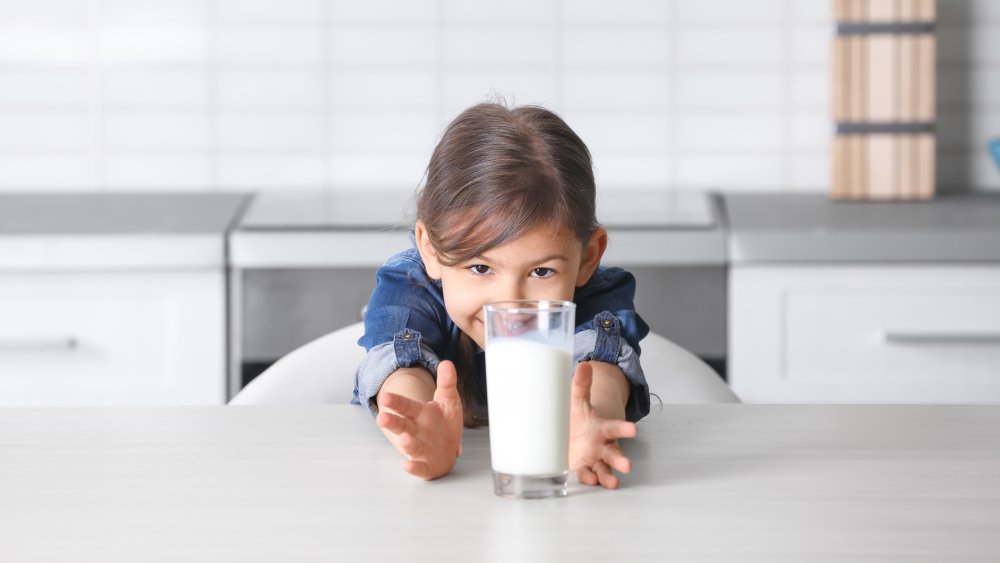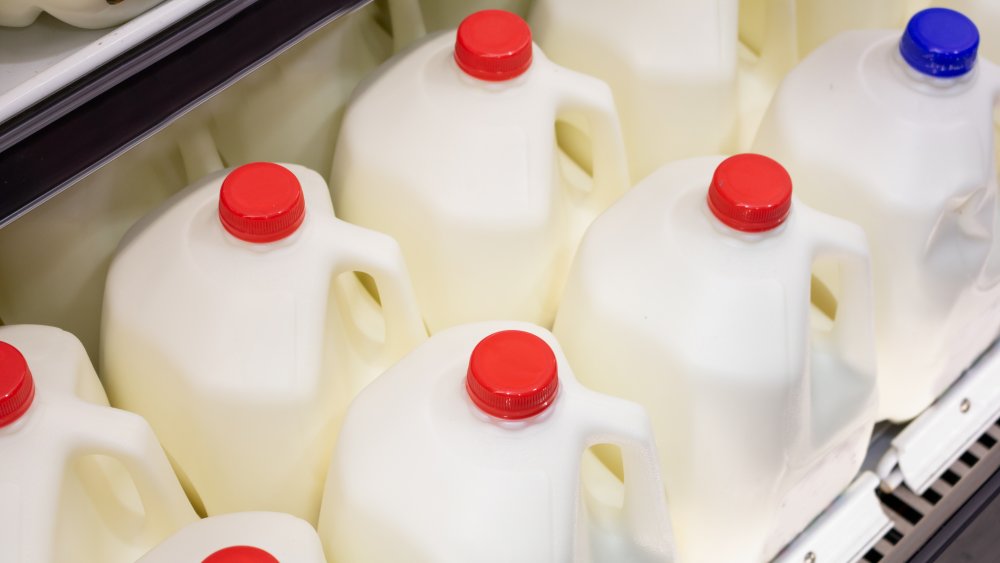Here's What Happens When You Drink Milk Every Day
Americans have a love hate relationship with milk. We drink a lot of it: In 2019, the United States produced about 217.5 billion pounds of milk for human consumption (via Statista). But over the years we've become increasingly skeptical as to whether or not it is good for us.
According to the U.S. government's 2015-2020 Dietary Guidelines, most Americans would benefit from drinking more milk. It's recommended that anyone 9 years and over drink 3 cup-equivalents of dairy, which includes non-fat and low-fat milk, yogurt, cheese, and fortified soy milk, (via U.S. Health and Human Services).
In the 1980s there was a popular slogan, "Milk does a body good. Pass it on." This campaign was created to get people to drink more of the creamy drink. The campaign extolled the benefits of drinking milk as helping to strengthen our bones, and prevent osteoporosis. Over the past couple of decades, people have been drinking more milk alternatives that span the gamut from soy, almond, oat, coconut, and that just names a few substitutions for the dairy product. And in recent years, we've started to ask how much good does milk really do, especially, when you drink it on a daily basis (via Medical News Today)?
Pros of drinking milk daily
Drinking milk on a daily basis is a hot topic for discussion depending who you talk to. First, let's look at the positives of milk. It is packed with nutrients, a good source of protein, and may help prevent weight gain (via Healthline).
Milk is a good source of potassium, B12, calcium, vitamin D, protein, and fatty acids. However, when choosing what kind of milk you drink, consider that some of the nutritional content of milk is largely dependent on the diet and treatment of the cow it comes from. Grass-fed cows will produce milk that contains significantly higher amounts of conjugated linoleic and omega-3 fatty acids, along vitamin E, and beta-carotene which help combat inflammation.
Meanwhile, the protein in milk has been linked to helping athletes with muscle recovery, and aid in preventing muscle loss. And if all of this doesn't assuage any negative judgment of milk, this might: A few studies out there suggest drinking milk might help fight obesity. But before you raid the grocery store of all the skim milk on its shelves, note that this weight control benefit only seems to be linked to drinking whole milk. This is likely because greater amounts of calcium and conjugated linoleic acid in whole milk boost weight loss.
Possible negative effects of drinking milk daily
While there are many positive aspects of drinking milk on a daily basis, there are also some negatives that may have you questioning whether or not you want to. For starters, milk has been linked to causing acne. The proteins in milk — whey and casein — stimulate growth and hormones. They also release something called IGF-1, a hormone that mimics insulin, and is a catalyst for dreaded breakouts. It's also believed that if you are lactose intolerant, and find your face popping with pimples, it could actually be an allergic reaction (via Healthline).
Milk can also cause some people to experience gas, feel bloated, and can play mean games with their digestive systems, resulting in cramping and diarrhea. This could very well indicate an intolerance to lactose, but this type of intolerance can vary wildly from person to person. First, lactose intolerance is the result of a deficiency of the enzyme, lactase. Lactase breaks down the sugar in milk. It's this process that can wreak havoc on your system. For some, all diary can be a problem, while others may be able to stomach it in various forms. If you are experiencing this problem, you may want to see a doctor and avoid daily consumption of milk (via Self).
To drink or not to drink milk?
While there are plenty of benefits to drinking milk daily, there have been some studies that suggest daily consumption of milk may negatively impact your health. Two doctors from Harvard recently took a good look at the studies and data out there, and concluded that the jury is still out. For example, they found that some studies suggest drinking milk will lower your risk of developing colorectal cancer, while others found that you might have an increase risk of breast, prostate, and endometrial cancer when you drink it daily. Such results suggest more research is needed.
They also took a look at whether or not drinking milk on a regular basis will help combat hip fractures. They concluded that the consumption of milk doesn't help, and instead pointed out that those countries that imbibe a lot of milk and calcium actually have the highest rate of hip fractures. And the researchers' opinions on milk consumption doesn't end there. They also agree that all of the studies and articles touting milk as an aid to prevent high blood pressure and reduce cholesterol levels are weak and inconclusive.
So, to drink milk or not to drink milk? The doctors concluded that the amount of milk needed can differ vastly from person to person, and consumption in moderation is the key, with 0 to 2 servings a day being optimal for adults.



